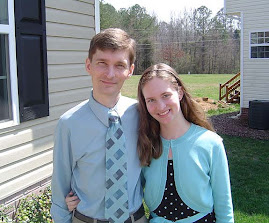Tuesday, August 24, 2010
Guess what? New polls! :)
Yes, that's right-there are four new polls up now, ready to be voted in! So, please do share with me your thoughts, and take a few seconds to vote in them. Thank you! :)
2 comments:
Hi!! Thank you so much for visiting my blog! Please come back often. Thank you for your comment as well; your input is always most welcome! Even if you disagree with something, I encourage you to leave a comment; I just ask that you do so in a loving and Christ-like manner.
God bless you!
~Rebekah S.
Subscribe to:
Post Comments (Atom)

























Your poll covers important topics. I'll comment on two.
ReplyDelete1. The phrase “separation of church and state” is but a metaphor to describe the underlying principle of the First Amendment and the no-religious-test clause of the Constitution. That the phrase does not appear in the text of the Constitution assumes much importance, it seems, only to those who may have once labored under the misimpression it was there and later learned they were mistaken. To those familiar with the Constitution, the absence of the metaphor commonly used to describe one of its principles is no more consequential than the absence of other phrases (e.g., Bill of Rights, separation of powers, checks and balances, fair trial, religious liberty) used to describe other undoubted Constitutional principles.
Some try to pass off the Supreme Court's decision in Everson v. Board of Education as simply a misreading of Jefferson's letter to the Danbury Baptists--as if that is the only basis of the Court's decision. Instructive as that letter is, it played but a small part in the Court's decision. Perhaps even more than Jefferson, James Madison influenced the Court's view. Madison, who had a central role in drafting the Constitution and the First Amendment, confirmed that he understood them to "[s]trongly guard[] . . . the separation between Religion and Government." Madison, Detached Memoranda (~1820). He made plain, too, that they guarded against more than just laws creating state sponsored churches or imposing a state religion. Mindful that even as new principles are proclaimed, old habits die hard and citizens and politicians could tend to entangle government and religion (e.g., "the appointment of chaplains to the two houses of Congress" and "for the army and navy" and "[r]eligious proclamations by the Executive recommending thanksgivings and fasts"), he considered the question whether these actions were "consistent with the Constitution, and with the pure principle of religious freedom" and responded: "In strictness the answer on both points must be in the negative. The Constitution of the United States forbids everything like an establishment of a national religion."
The First Amendment embodies the simple, just idea that each of us should be free to exercise his or her religious views without expecting that the government will endorse or promote those views and without fearing that the government will endorse or promote the religious views of others. By keeping government and religion separate, the establishment clause serves to protect the freedom of all to exercise their religion. Reasonable people may differ, of course, on how these principles should be applied in particular situations, but the principles are hardly to be doubted. Moreover, they are good, sound principles that should be nurtured and defended, not attacked. Efforts to undercut our secular government by somehow merging or infusing it with religion should be resisted by every patriot.
Wake Forest University recently published a short, objective Q&A primer on the current law of separation of church and state--as applied by the courts rather than as caricatured in the blogosphere. I commend it to you. http://tiny.cc/6nnnx
2. Regarding "absolute truth," some questions may be answered true or false: E.g., does 2 plus 2 equal 4? Others are not susceptible of such an answer and can only be answered "relative" to some standard: E.g., is X hot or cold, hard or soft, good or bad?
ReplyDeleteWith respect to the latter category, the issue is not whether the answer offered by some is "relative" and others "absolute." All of the answers are inherently relative in that they can only be understood as related to some standard. The issue is which standards one uses and how one chooses those standards. Theists envision receiving theirs from god(s), though they effectively choose many of the standards themselves depending on which holy book of which religion interpreted by which wise men they select (by actual choice or merely by accident of birth). Standards selected this way are termed "absolute" by some. Some derive their standards by some manner of conscious thought and choice. Standards selected this way are termed "relative" by some.